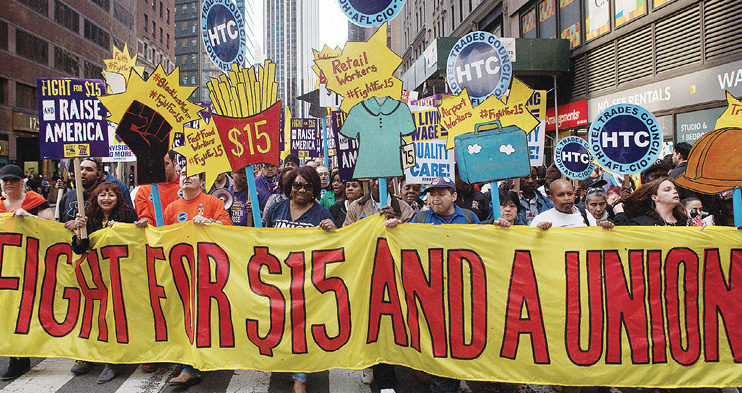Fast Food Workers Walk Off Job in ‘Fight for 15’
January 1, 2016

Courtesy of Victor J. Blue/Getty Images
(This article first appeared in the January-February 2016 issue of The American Postal Worker magazine.)
Tens of thousands of fast food workers walked off the job Nov. 10 to call for raising the minimum wage to $15 an hour and granting all workers the right to unionize.
The strike was the biggest action since the Fight for 15 campaign was formed three years ago by workers, students, racial justice activists, advocates for climate change solutions, and unions.
Mass demonstrations took place outside McDonald’s locations in New York City, Boston, Philadelphia, Pittsburgh, Detroit, Milwaukee, Chicago, Denver, Madison, Phoenix, Wichita, Raleigh, and Rochester, among other cities.
Shariff El-Shariff is a 36-year-old Starbucks shift supervisor in Washington, DC, who earns $14 an hour.
“We’re struggling. We need to raise our kids and raise our families,” he said. “With the price of food and the price of rent, we don’t know what to do. I work with people who make $11 per hour. It’s not enough for them. We’ll struggle until we get what we need.”
Retail Workers Score Scheduling Victories
After months of protests and rallies, workers at some of the country’s largest retail chains won scheduling reform late in 2015.
Workers have been fighting on-call scheduling practices where they don’t know their schedules until the last minute, making it almost impossible to plan for childcare or have any control over their personal time.
Abercrombie & Fitch
In August, Abercrombie & Fitch announced the end of their on-call practice in all of their 799 stores across the country. Stores now must alert workers to their schedules a week in advance and must give email alerts about unexpected scheduling needs.
However, the high-end retailer is being scrutinized for alleged discriminatory hiring practices and catering to people who are considered “attractive” by conventional standards.
“We go after the cool kids,” admitted CEO Michael Jeffries in an interview with Salon. “We go after the attractive all-American kid with a great attitude and a lot of friends. A lot of people don’t belong [in our clothes], and they can’t belong. Are we exclusionary? Absolutely.”
The clothing chain is also often under fire for failing to carry large-sized clothing.
Victoria’s Secret
In June, Victoria’s Secret ended on-call scheduling after workers spoke to the news outlet Buzzfeed, citing predatory and abusive practices.
Worker Chelsea Rosario posted a picture of herself on Twitter while she was on hold for a whopping 25 minutes just to find out if she had to work that afternoon.
“Who gets put on HOLD for this long for a call-in shift?” she wrote. “My call-in is at 1 p.m. for a 3 p.m. shift. What the heck?”
Other employees told Buzzfeed that they were often required to be available for shifts that were cancelled at the last minute – with no compensation.
Victoria Secret’s parent company, L Brands, was sued in California in 2014 for the same anti-worker practices.
Gap, Inc.
Gap, Inc., which includes its five brands – Athleta, Gap, Old Navy, Intermix and Banana Republic – ended on-call scheduling at the end of September. Gap did note the importance of “work-life integration” to their employees and committed itself to ensuring “consistent and reliable scheduling.”



